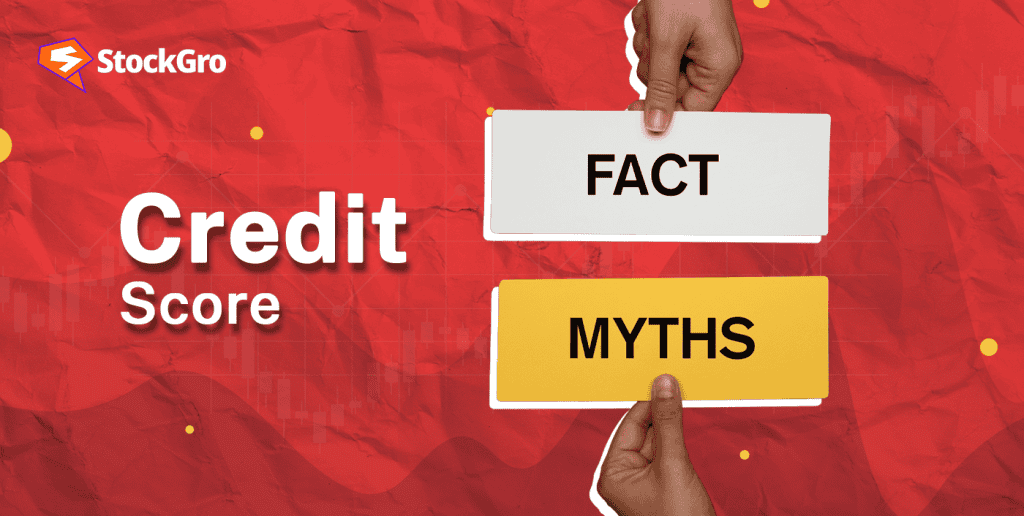
Debt management is a crucial part of an individual’s financial journey. This debt management is catalysed by understanding and improving your credit score. Imagine buying a car and being denied its loan due to a poor credit score. Therefore, understanding your credit score becomes very crucial.
It is a report card for an individual to show his/her repayment capacity and health. Apart from this, it affects several elements of your credit that can make a significant impact otherwise on your credit procurement.
However, when people do not have clarity of its aspects, they usually perceive things, and due to it, myths are created. Similarly, myths about credit scores can potentially confuse people. Let’s check the facts for some of these common credit score myths.
What is the credit score?
A representation of an individual’s credit repayment capacity in a numerical score is the credit score. It is one of the most used measures by lending institutions like banks, non-banking financial companies, government bodies, etc., to guarantee a person’s credit behaviour. People with higher credit scores are recipients of better credit facilities.
A credit score is calculated based on some of the following aspects:
- Credit repayment history on an individual. Its time, amount and frequency are crucial.
- Utilisation of credit that is previously procured. This ratio measures the used credit compared to the total credit by the person.
- The number of years a person has credit liability ongoing is assessed. It is also known as the length of credit history.
- The availability of varied credit sources, such as credit cards, car loans, mortgages, etc., is checked. This credit mix indicates the diversification of sources and management.
- The applicant’s occupational status and other demographics will be checked. It may not have a notable impact but can help ascertain qualitative aspects of that person.
An interesting read: Credit history: What is it and why it matters?
Individuals can improve their credit scores by managing these aspects. However, there are myths about credit scores that can spread misinformation.
Credit score myths and facts
- Income will impact the credit score.
Income, income source or occupation will not directly impact an individual’s credit score. It may vary in different life phases, and it cannot be included in the credit score calculation. However, this myth about credit scores can be half true. Individuals earning high incomes can easily repay their credit and manage their debt. However, this may stand false in certain cases if an individual implements efficient management strategies despite low income.
- CIBIL is the only source to get credit score
A credit score is usually regarded as a CIBIL score. However, it is just one of the four credit information companies (CICs) available in India. Transunion CIBIL (Credit Information Bureau India Limited) was established in 2000 under the guidelines of the RBI Siddhique committee and has a strong presence in the market.
Therefore, credit scores can be procured from the four authorised CICs in India. These CICs are as follows:
- Experian Credit Information Company of India Pvt Ltd
- Equifax Credit Information Services Pvt Ltd
- CRIF High Mark
Must read: How to repair a bad CIBIL report
- Student loans don’t affect my credit score.
The loans disbursed for higher education of the students usually have less stringent norms. They offer low interest rates, extended tenure and other qualitative benefits. However, such relaxation doesn’t imply that they don’t affect the overall credit score. It functions similarly to other loans, and repayments of student loans affect the credit scores. Therefore, borrowers should consider this while managing the repayment.
- Debit cards can improve the credit score.
A debit card can be referred to as a paperless payment tool that withdraws money from a person’s bank account. Due to this, information regarding transactions through debit cards is not reported to the bureau. Therefore, it will not improve or degrade the credit score.
However, credit cards, which have prescribed limits from a lender, are one type of loan which is repaid after the transactions. Therefore, its repayment has a significant impact on the credit score.
- The credit card balance will improve the score.
It is one of the most common myths about credit scores. When an individual purchases a credit card, his/her repayment capacity is checked, and a limit is decided. This procedure is postpaid, and repayment is the responsibility of the cardholder. However, when a person fails to repay the monthly bill, the balance is carried forward to the next month.
The belief that this balance can benefit the cardholders is false. In turn, such behaviour may harm the credit score. Lack of regular and full repayment may indicate irresponsible debt management. Therefore, individuals should not fall for such advice.
Check this out! Understanding credit cards: What are they, and how do they work?
Bottomline
The usage and necessity of a good credit score are crucial as it facilitates smooth credit procurement. However, understanding and not falling for myths about credit score is equally essential. Individuals should consider the above-mentioned myths and stay alert to avoid getting misled.
FAQs
- What hits the credit score?
While checking the repayment capacity and creditworthiness of an individual, the credit score can be affected by that person’s payment history, existing loan records and credit mix. Apart from this, other information like employment status and dependency can also be checked.
- What are the benefits of credit scores?
These days, a credit score is accessed every time a person’s creditworthiness is checked. Having a credit score helps in a seamless loan procedure. Moreover, the interest rates and other terms for such loans can also be negotiated. Therefore, individuals can make their debt cheaper with a good credit score.
- Can debit cards affect the credit score?
In a debit card, the money is withdrawn from the bank account of an individual. Therefore, there is no aspect of credit in this transaction. It is not reported to credit rating bureaus for calculation of credit score. However, credit card transactions will be reflected in the credit score.
- What is a good credit score?
Different credit rating agencies may have varying measures of good credit scores. As per CIBIL, a good credit score is above 700. Others like Experian and Equifax have good credit scores above 670. Moreover, credit is affected by varied aspects. Individuals can work on these aspects to improve their scores.
- Is zero credit ideal?
A good credit score indicates responsible and creditworthy behaviour. Therefore, having no credit would not directly impact the credit score. Also, having no credit is better than chaotic credit repayment. If an individual has zero credit, the credit rating agencies will not be able to understand the repayment patterns and rates.

